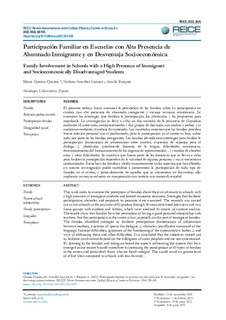| dc.rights.license | Attribution-NonCommercial-NoDerivatives 4.0 International | * |
| dc.contributor.author | Quintas-Quintas, Marta | |
| dc.contributor.author | Arratibel-Insausti, Nekane | |
| dc.contributor.author | Barquin, Amelia | |
| dc.date.accessioned | 2022-09-27T11:49:50Z | |
| dc.date.available | 2022-09-27T11:49:50Z | |
| dc.date.issued | 2022 | |
| dc.identifier.issn | 1696-4713 | en |
| dc.identifier.other | https://katalogoa.mondragon.edu/janium-bin/janium_login_opac.pl?find&ficha_no=168457 | en |
| dc.identifier.uri | https://hdl.handle.net/20.500.11984/5707 | |
| dc.description.abstract | El presente trabajo busca examinar la percepción de las familias sobre su participación en centros con alta presencia de alumnado inmigrante y escasos recursos económicos. Se examinan las estrategias que facilitan la participación, los obstáculos y las propuestas para impulsarla. La investigación se llevó a cabo en dos escuelas de la provincia de Gipuzkoa mediante 18 entrevistas semiestructuradas y dos grupos de discusión con madres y padres y se analizaron mediante el análisis de contenido. Los resultados muestran que las familias perciben buena relación personal con el profesorado, pero la participación en el centro es baja, sobre todo por parte de las familias inmigrantes. Las familias identificaron estrategias para facilitar la participación (transmisión de información entre madres, existencia de espacios para el diálogo...), obstáculos (insuficiente dominio de la lengua, dificultades económicas, desconocimiento del funcionamiento de los órganos de representación...) y modos de abordar estas y otras dificultades. Se concluye que buena parte de las iniciativas que se llevan a cabo para facilitar la participación dependen de la voluntad de algunas personas y no se encuentran sistematizadas. Escuchar a las familias e incidir conjuntamente en los aspectos que han aflorado en nuestra investigación puede contribuir a incrementar la participación de todo tipo de familias en el centro, y particularmente de aquellas que se encuentran en desventaja; ello implicaría un mayor esfuerzo en comparación con centros con menor diversidad | es |
| dc.description.abstract | This work seeks to examine the perception of families about their involvement in schools with a high presence of immigrant students and limited economic resources. Strategies that facilitate participation, obstacles and proposals to promote it are examined. The research was carried out in two schools in the province of Gipuzkoa through 18 semi-structured interviews and two focus-groups with mothers and fathers, which were analyzed by means of content analysis. The results show that families have the perception of having a good personal relationship with teachers, but that participation in the center is low, especially on the part of immigrant families. The families identified strategies to facilitate participation (transmission of information between mothers, existence of spaces for dialogue...), obstacles (insufficient command of the language, financial difficulties, ignorance of the functioning of the representative bodies...) and ways of addressing these and other difficulties. It is concluded that the initiatives carried out to facilitate involvement depend on the willingness of some people and are not systematized. By listening to the families and taking on board the aspects influencing the aspects that have emerged in our research could contribute to increasing the participation of all types of families in the center, and particularly those who are disadvantaged. This would involve a greater level of effort when compared to schools with less diversity. | en |
| dc.language.iso | spa | en |
| dc.publisher | Universidad Autónoma de Madrid | en |
| dc.rights | © REICE | en |
| dc.rights.uri | http://creativecommons.org/licenses/by-nc-nd/4.0/ | * |
| dc.subject | Familia | es |
| dc.subject | Relación padres-escuela | es |
| dc.subject | Participación familiar | es |
| dc.subject | Desigualdad social | es |
| dc.subject | Percepción | es |
| dc.subject | Family | en |
| dc.subject | Parent-school relationship | en |
| dc.subject | Family participation | en |
| dc.subject | Inequality | en |
| dc.subject | Perception | en |
| dc.title | Participación Familiar en Escuelas con Alta Presencia de Alumnado Inmigrante y en Desventaja Socioeconómica | es |
| dcterms.accessRights | http://purl.org/coar/access_right/c_abf2 | en |
| dcterms.source | REICE. Revista Iberoamericana sobre Calidad, Eficacia y Cambio en Educación | en |
| local.contributor.group | Berrikuntza eta esku-hartzea gizarte kulturanitz eta eleanitzetan | eu |
| local.description.peerreviewed | true | en |
| local.description.publicationfirstpage | 89 | en |
| local.description.publicationlastpage | 105 | en |
| local.identifier.doi | https://doi.org/10.15366/reice2022.20.4.005 | en |
| local.source.details | Vol. 20, nº 4, pp. 89-105 | en |
| oaire.format.mimetype | application/pdf | |
| oaire.file | $DSPACE\assetstore | |
| oaire.resourceType | http://purl.org/coar/resource_type/c_6501 | en |
| oaire.version | http://purl.org/coar/version/c_970fb48d4fbd8a85 | en |








